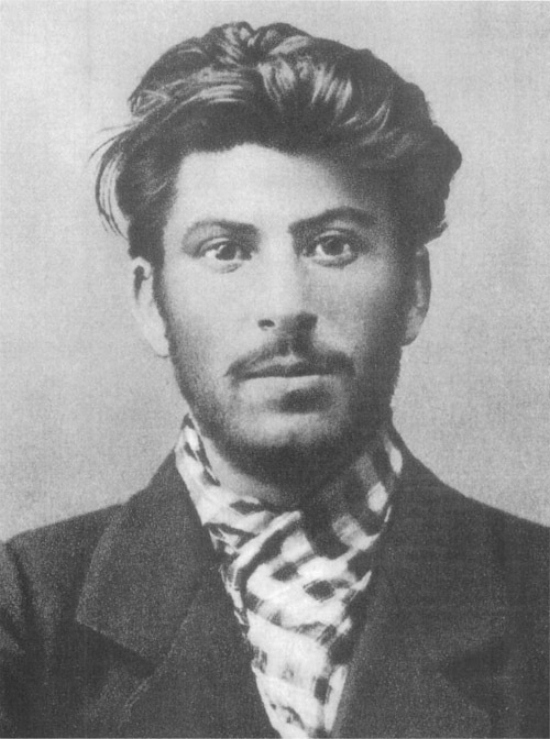The Godfather, Part I: Stalin as a Boy
Simon Sebag Montefiore: Young Stalin
The New York Sun, October 24, 2007
When Josef Stalin finally succumbed to the stroke he so richly deserved, a distraught Pablo Neruda mourned the death of this "giant. ... the noon, the maturity of man and the peoples." Such attitudes are, mercifully, now rare. Once known genially as "Uncle Joe," Stalin is now regularly reviled as a monster and a despot to be ranked with history's worst.
Despite this, it continues to be the case that, in the popular imagination, the name Stalin fails to deliver anything like the sense of horror conjured up by Hitler. The reasons include the persistence of leftist ideology, the fact of cultural distance, and the recollection of wartime alliance. There's something else, however, that should not be overlooked: Stalin the man is barely known, and what is thought to be known is that he was something of a plodder, a bureaucrat, the embodiment of Soviet drab: in other words, a bore. That's not a quality humanity expects from its enduring villains: Just ask Shakespeare, just ask Milton.
In our memory, Hitler is not only the incarnation of evil but also its most vivid caricature. By contrast, in public Stalin was managerial rather than charismatic, cleverly distanced from the cult of personality that enveloped him. He went to extraordinary lengths to ensure that little of substance was disclosed about his private life. His biography was transformed into pious myth, systematically drained of real interest. Those few people who knew the truth, or part of the truth, managed to survive only if they kept it to themselves.
While this culture of secrecy began to change during the Khrushchev era, the twists, turns and imperatives of Kremlin politics conspired to keep the real Stalin hidden from the historical record. After 1991 this was no longer so, but while the details of Stalin's crimes are now widely available, the individual who inspired them has remained a strangely elusive figure, still scarcely more than the "gray blur" of ancient Menshevik libel. If any historian can bring an end to this relative indifference it is Simon Sebag Montefiore. His bestselling "Stalin: The Court of the Red Tsar" (2003) was a masterful, magnificently readable, and immaculately researched account of the Soviet leader's long rule. As a portrait of ascendant malignance, it has rarely been equaled.
Mr. Sebag Montefiore's new book adds more depth to this picture. "Young Stalin" (Knopf, 460 pages, $30) is a kind of prequel to the earlier volume. It tells the story of the dictator's earlier years, from Georgian boyhood to his (often underrated) role as one of the key organizers of the Bolsheviks' Petrograd coup. Even told badly, this would be fascinating, but the ever-fluent Mr. Sebag Montefiore recounts it with brio, insight, and quite remarkable amounts of additional, never-before published information: I read it in one sitting. In some ways "Young Stalin" comes across as a picaresque, if grim, adventure, a bawdy chronicle of seminary school rebellion, banditry, bank robbery, revolutionary intrigue, jail, piracy, extortion, love, murder, romance, exile, scandal, and, even, hunting trips with the tribesmen of the remote arctic taiga. It doesn't hurt either that Mr. Sebag Montefiore's considerable literary gifts allow him to bring life back to the lost, exotic realm within which his saga unfolds, the brutal mass of contradictions that made up the Romanovs' ramshackle, doomed empire.
The fact that, for most of his youth, Stalin was a fairly marginal figure enables Mr. Sebag Montefiore to focus even more closely on the character of his subject. Young Stalin comes across, like so many psychopaths, as charming, manipulative, and highly intelligent. Musically gifted, an accomplished poet, and a relentless autodidact, he was no less of an intellectual than the revolutionaries he so liked to disdain. But, crucially, he was also what he was proud to call a praktik, a tough guy capable of doing the "black work" of revolution. Stalin was only in his early 20s when he moved to the oil port of Batumi. 'Within three months, the Rothschilds' refinery had mysteriously caught fire ... the town was flooded with Marxist pamphlets; informers were being murdered ... factory managers shot.'
There was, of course, far, far worse to come. For reasons we can only guess at, Stalin not only excelled at black work; he relished it. Part of the blame for this must lie with a dirt-poor childhood spent in a town notorious for its hard-edged and thuggish ethos, a childhood scarred also by violence that extended into the home itself: His father was an abusive drunk. Nobody could be trusted, not even family. Throw in Stalin's psychopathy, his egomania, his seminary-sharpened ability to detect heretics, and his experience of the way the tsarist secret police managed to suborn so many supposedly loyal comrades and we can detect the outlines of the nightmare to come. Vladimir Lenin certainly could, and he was thrilled. "That chef," he commented, "will cook up some spicy dishes." So he did. And with them he poisoned a culture, a nation, and a world.
